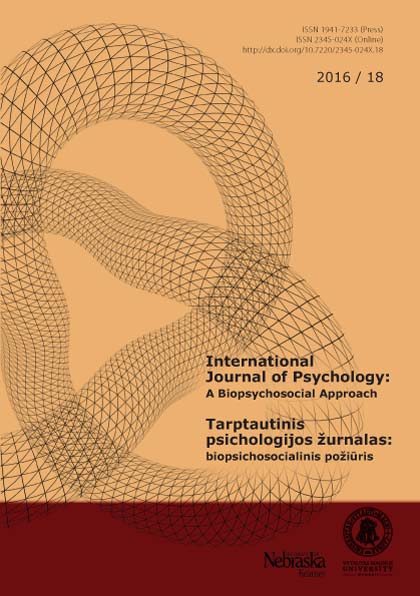PSYCHOMETRICS OF THE READINESS TO CHANGE QUESTIONNAIRE (RCQ): THE LITHUANIAN VERSION
PSYCHOMETRICS OF THE READINESS TO CHANGE QUESTIONNAIRE (RCQ): THE LITHUANIAN VERSION
Author(s): Raimonda Petrolienė, Liuda Šinkariova, Loreta Zajančkauskaitė Staskevičienė, Jurga Misiūnienė, Laura AlčiauskaitėSubject(s): Social Sciences, Psychology, Health and medicine and law
Published by: Vytauto Didžiojo Universitetas
Keywords: Readiness to change questionnaire; Cardiac rehabilitation; Readiness to change health behavior; Lifestyle; Validity; Reliability;
Summary/Abstract: Background: It is well known that unhealthy lifestyle is one of the most important risk factors for morbidity and mortality due to cardiac diseases. People who suffered or are suffering from heart related problems usually undertake cardiac rehabilitation procedures which help them improve their health and make lifestyle changes. So it is important to have a valid, short, clear measure of readiness to change health behavior in the native (Lithuanian) language as change in lifestyle can be a problematic field in rehabilitation of cardiac patients in Lithuania. According to the results of national study, smoking, unhealthy diet, low physical activity, overweight and risky alcohol consumption persist as actual problem among Lithuanian adults nowadays. The aim of this analysis is to examine psychometric properties of the “Readiness to change questionnaire” (RCQ, Rollnick et al., 1992) among cardiac rehabilitation patients. Methods: The internal consistency, test-retest reliability, concurrent validity and factor structure of the RCQ was examined for 59 cardiac patients aged between 35 and 70 years (Mean = 55.68, SD = 8.62). The questionnaires for alcohol consumption, smoking, physical activity and diet were completed at the beginning and end of rehabilitation. Results: Cronbach’s alpha coefficients of the RCQ showed poor to good internal consistency (0.51–0.87) and test-retest reliability Pearson’s correlations ranged from 0.31 to 0.84. Concurrent validity is supported for the stages of alcohol consumption and diet. An exploratory factor analysis of the RCQ indicated the three-factor solution for readiness to change alcohol consumption and diet data best. Confirmatory factor analysis indicated that models demonstrate approximate data–model fit. Conclusions: The Lithuanian version of the RCQ is a reliable measure for group testing. Further investigations regarding validity and factor structure are required with a bigger sample size.
Journal: Tarptautinis psichologijos žurnalas: biopsichosocialinis požiūris
- Issue Year: 2016
- Issue No: 18
- Page Range: 51-69
- Page Count: 19
- Language: English

